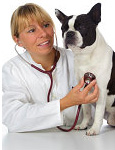
Dog vaccination
Does my dog need to be vaccinated?
Factors that increase the risk of adverse reactions to vaccinations in dogs
Signs of adverse vaccine reaction in dogs
Tips for scheduling dog vaccination
Does my dog need to be vaccinated?
 Vaccinations are an important part of taking good care of your dog. What is a dog vaccination? By vaccinating your dog you are enabling the dog's immune system to be able to fight the invasion of disease-causing organisms. Vaccinations are an important part of taking good care of your dog. What is a dog vaccination? By vaccinating your dog you are enabling the dog's immune system to be able to fight the invasion of disease-causing organisms.
Rabies vaccine, for example, is required by law. Rabies is a preventable viral disease of mammals most often transmitted through the bite or scratch of a rabid animal. Rabies affects the brain and the central nervous system of mammals. The disease is almost always fatal if not treated before the symptoms begin. The symptoms of rabies include fever, headache, nausea, vomiting, agitation, confusion and anxiety.
According to UC Davis Veterinary Medicine, authorities highly recommend you vaccinate your dog against canine parvovirus, distemper virus, adenovirus type 2 and hepatitis. To find out the list of vaccinations that your dog may benefit from - check with your veterinarian. Your veterinarian will help you to determine the best vaccination schedule for your pet. Many factors will be taken into account, such as the age of the dog, breed, medical history of the dog and lifestyle of the dog. If you need to put the dog in a boarding kennel once in a while, you will need to vaccinate the dog against canine parainfluenza virus and bordetella bronchiseptica to protect your pet from common diseases that dogs often acquire in boarding kennels. Keep a close eye on epidemics in your local area. For example, in 2011 in New York, there was an outbreak of dog flu. Be mindful not to give your dog too many unnecessary vaccinations, as some can cause side effects including grumpiness and depression.
How to vaccinate a dog?
Ask your veterinarian which vaccines are recommended for your dog. There are many considerations that veterinarians may look at when deciding which vaccines are needed for your pet. For example, some vaccinations are required by dog boarding facilities and unless the dog is properly vaccinated, the dog boarding may not accept the dog due to safety reasons. Your geographical location may also play a role when a vet decides whether the dog needs certain vaccinations or not.
Check with your veterinarian regarding risks associated with the vaccine that will be administered to your dog. Only give your dog one vaccine during a visit to avoid adverse reactions which can range from hives to shock or even death. If you have a small breed dog - be especially careful not to give multiple vaccinations as small breeds tend to be at most risk for adverse reactions due to smaller weight.
When the dog is not feeling well - vaccination should be postponed. Never vaccinate your dog in the several weeks before and after surgery or moving to a new home.
Adverse reactions to vaccinations in dogs
Your dog is younger than 8 weeks old.
Your dog is pregnant.
Your dog is teething.
Your dog recently had a surgery.
Your dog moved to a new home within 5 weeks.
Your dog is not feeling well.
Your dog is a small breed.
Your dog is getting more than one vaccination at a time.
Your dog has a history of vaccine reactions.
How do you know that your dog has an adverse reaction to a vaccination?
Watch for the following signs within the next 6 weeks after a vaccination:
Dog has trouble moving
Dog has trouble breathing
Dog's face swells
Dog's behavior changes
Dog seems to not be feeling well
If you notice any of the above, you need to consult with your veterinarian immediately.
Tips for scheduling vaccinations and ensuring your pet's wellbeing after the vaccination:
Try to schedule vaccination in the morning (and be sure to check if the veterinarian will be available the following day) so that in case there are any adverse reactions during the day of the pet vaccination or the following day, your veterinarian will be available to help.
Stay in the veterinarian clinic vicinity during the next few hours after a vaccination.
Check your dog for reactions during the night following the pet vaccination.
|